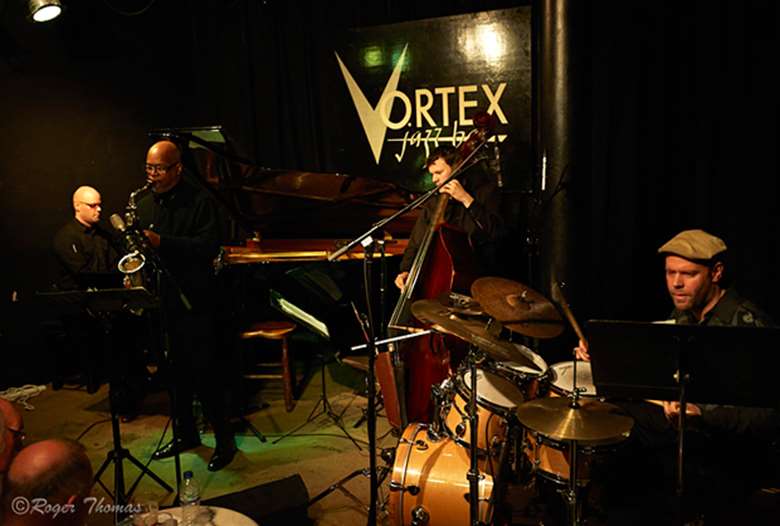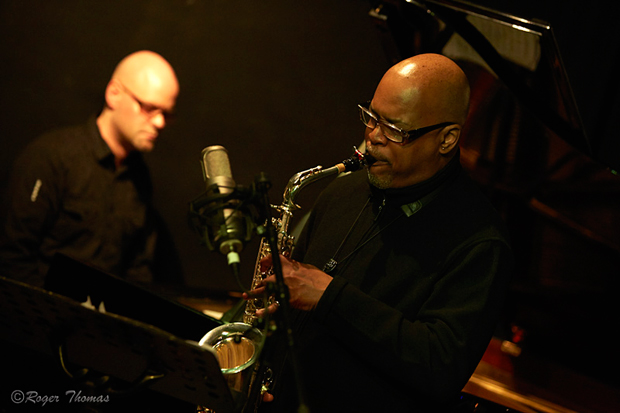Vein and Osby get the Vortex spinning
Tuesday, April 29, 2014
The title of Swiss trio Vein’s new release, Vote for Vein!, sounds like an offbeat TV satire.

The sleeve, with three garishly suited, grinning men who look as though they’re about to present Match of the Day, is also boldly ironic. Fortunately, the musicians who appeared at the Vortex on 24 April, for one of their rare UK appearances, looked much more like ordinary jazzers. And they sounded like extraordinary ones; playing with an intense and intricate togetherness few bands can match.
They were joined by American alto player Greg Osby, who has returned to playing more structured music much like his years of peak involvement in New York’s radically free-spirited M-Base collective. The four were mid-way through a blizzard of gigs from Tallinn, Estonia, to the Mediterranean island of Menorca, and UK appearances are rare. Osby is one of three distinguished soloists (the others are Dave Liebman and trombonist Glenn Ferris) with whom Vein has a regular partnership.
But Osby’s presence clearly didn’t make this a quartet. There was an interesting tension on the boundary between the trio’s integrity and Osby’s freelance role, as the reeds man would sometimes take control, skirmish menacingly with his angular, quick-shifting alto phrases and bursts of Coltranesque epiphany, while at other times he stood back completely and observed the trio’s painstaking work.
 They played a combination of Osby’s earnestly titled compositions (you can’t imagine ‘Dialectical Interchange’ being much of a hit at The Cotton Club) and the Swiss players’ gnomically witty pieces, such as ‘No We Can’t (But Vote For Us Anyway)’. Perhaps most typical of their approach was the medley of the trio players’ compositions played towards the end of the first set: bassist Thomas Lähns’ ‘Eat the Rich’, drummer Florian Arbenz’ ‘Moving Towards the End of a Counter-Trend’, and pianist Michael Arbenz’ ‘Love the Difference’. Movement between pieces, and between band members, was beautifully fluid.
They played a combination of Osby’s earnestly titled compositions (you can’t imagine ‘Dialectical Interchange’ being much of a hit at The Cotton Club) and the Swiss players’ gnomically witty pieces, such as ‘No We Can’t (But Vote For Us Anyway)’. Perhaps most typical of their approach was the medley of the trio players’ compositions played towards the end of the first set: bassist Thomas Lähns’ ‘Eat the Rich’, drummer Florian Arbenz’ ‘Moving Towards the End of a Counter-Trend’, and pianist Michael Arbenz’ ‘Love the Difference’. Movement between pieces, and between band members, was beautifully fluid.
In general, Osby’s pieces gave him the scope to solo freely, with the band in support, while solos within the trio were a kind of whirling, grappling display of playful interrogation, less about individual freedom, more a kind of sublime conversational high. Drummer Florian Arbenz would respond to a solo on bass or piano by dropping the volume, but often increasing the complexity of his beat, and teasing the soloist with his feathery rhythms. Bassist Thomas Lähns, though classically trained, often played his upright, acoustic bass like a bass guitar, with fast-fingered runs covering several octaves, and edgy, plucked chords. Pianist Michael Arbenz often sounded a little like Liam Noble, with a striking, percussive control of rhythm. There were moments of light rhythmic playfulness to match his brother on drums, and a passage in their medley of pieces when the ripples of sweet piano harmony began to sound like Debussy.
Towards the end of the second set they brought the audience, reeling by this point at the blistering development of musical ideas, gently down to earth with a version of ‘Summertime’ that was almost conventional. Osby began noodling fragments of the tune over a typically spiky Florian Arbenz drum patter, while Michael Arbenz gradually asserted control with piano. When the tune was returned to Osby at the end of the piece, it was shredded to slivers of nostalgia.
In the end, it would be a waste to vote for Vein, or Osby; they’re much too talented musically to run the government. They’re not here much, but they’re well worth the journey.
– Matthew Wright
– Photos © Roger Thomas